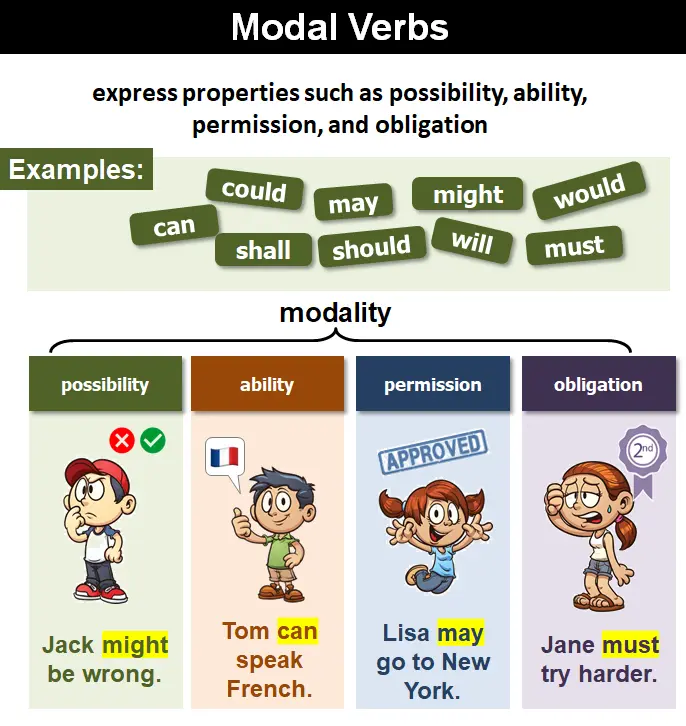The main modal verbs are “can,” “could,” “may,” “might,” “shall,” “should,” “will,” “would,” and “must.” Modal verbs refers to “modality”, which is possibility, ability, permission, obligation, and condition.

Present Modal Verbs
Subject + Modal Verb + Base Form of Main Verb + (complements/phrases)
Unlike a normal verb, a modal verb does not change. In other words, a modal verb does not conjugate, have participle forms, or have an infinitive form. For example:
play/plays playing/played [to play]
can X X
Modal Verbs Showing Possibility
“can,” “could,” “may,” or “might” + [base form]
Alan can play football against St. Joseph’s.
Alan could play against St. Joseph’s because he cancell[ed] his holiday.
(Note that “could” is the past-tense version of “can.”)
We use could because of the word cancelled. Its past tense so the possibility takes in past tense..hence ‘could’.
People may hear your words, but they feel your attitude.
(This means “people will likely hear your words.”)
You might be wrong.
(This means “maybe you are wrong.”)
Modal Verbs Showing Ability
“can” or “could” + [base form]
John can speak German.
(“Can” is most commonly used to show ability. This means “John is able to speak German.”)
John [could] speak French when he [was] a boy.
(Note that “could” is the past-tense version of “can.” This means “John was able to speak French.”) We’re talking past tense there because of [was], hence the possibility ‘can’ must be in past tense, hence ‘could’.
Modal Verbs Showing Permission
“can” or “may” + [base form]
You can swim in the lake.
(“Can” is also used to express permission.)
You may swim in the lake.
(“May” is more polite than “can” when expressing permission.)
Modal Verbs Showing Obligation
“shall,” “should,” or “must” + [base form]
We shall defend our island, whatever the cost may be.
(Shall means “expressing a strong assertion”, so “We have no option but to defend our island.”)
The aim of argument should be progress not victory.
(This means “It is right if the aim of argument is progress.”)
You must do the things you think you cannot do.
(This means “It is right to do the things you think you cannot do.”)
Modal Verbs Showing Condition
“would” + [base form]
The word “happy” would lose its meaning if it were not balanced by sadness. correct tick (Swiss psychiatrist Carl Jung)
(Sadness is needed for “happy” to exist. It is a condition.)
Past modal verbs
Subject + modal verb + have + past participle + (complements/phrases)
The format below is another common way of using modal verbs:
[modal verb] + “have” + [past participle]
This structure is typically used for expressing modality (e.g., possibility, ability, permission, obligation, and condition) in the past tense.